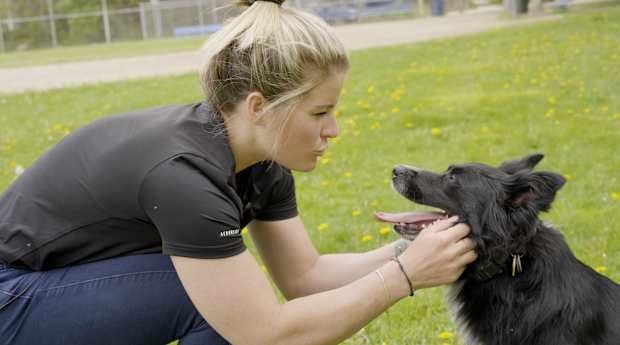When Brianna Decker broke her leg at the 2022 Beijing Games, it wasn’t just the three-time Olympian who was feeling the pain of her limited mobility. Missy had some adjusting to do, too.
“I was a little nervous that she wasn't going to recognize that I had an injury,” the 31-year-old Decker says. “But she was great. And it was so good to see her. She just jumped on me, and kisses, and everything like that.”
The very good girl in question here is Missy, Decker’s “spunky” 2-year-old border collie–blue heeler mix, who the hockey player got early in the pandemic. Originally, having Missy helped Decker tune out the uncertainty that clouded many at the start of lockdown. Now, Missy is there to help Decker in her recovery both mentally and physically.
Just 10 minutes into the United States’ opening game of the 2022 Olympics, Decker collided with Finland’s Ronja Savolainen. As the two fell to the ice, Decker’s leg got tangled underneath Savolainen’s body and the mostly empty arena was suddenly filled with Decker’s screams. “I knew it was broken right away,” she says. Three shifts into defending her gold medal, it was clear that she was done for the tournament as medical personnel carried the star center off the ice on a stretcher, leaving her teammates visibly shaken by it all. “I didn't want to end my Olympic Games like that.”
View the original article to see embedded media.
With a broken left fibula and several torn ligaments in her ankle, Decker was eager to go back home to get her impending surgery over with, see her family and reunite with Missy. But instead of doing that right away, the alternate captain chose to stay with her team, grabbing a clipboard and putting on her coach’s hat—a role she’s familiar with, having served as an assistant at the 2019 U-18 worlds and as the current associate head coach at her alma mater Shattuck-St. Mary’s in Minnesota.
Decker and her teammates ended the tournament with silver medals around their necks, losing to archrival Canada in the final game. And while that part of the journey was over, her recovery was just beginning. Two days after returning to the U.S., Decker had surgery on her leg. The next day, she finally got to see Missy.
“At that point, I hadn't seen her since Christmas, so it was like a little over two months,” Decker says. “And it was awesome to see her. She was super excited.”

Between her active breed mix and relatively young age, Missy doesn’t necessarily seem compatible in the rehabilitation of her owner’s gruesome leg injury on paper. But in actuality, the two seem to have a routine down that works best for both of them. The days start with a four-mile walk before Decker does her own workout, which is then followed by a hefty 30–40 minute ball-throwing session for Missy. On rainy days when all of that isn’t in the cards, they work on a new trick, “just because there’s nothing else to do, except, obviously, wiping off a wet dog,” Decker says. “But I love that she keeps me active, even outside of my training schedule.”
Decker has stayed on track in her recovery. The first six weeks after her surgery were the toughest, she says, but she has been free from a cast or boot the last couple of months and is focused on when she can return to the ice, where she feels like her regular self.
Off the ice, though, Decker has had an athletic companion with “a bit of an attitude” to keep life balanced and as normal as possible.
“Pets, especially dogs, help with mental health,” Decker says. “I just think that they have a huge impact—as far as keeping your mind off the things that are bothering you or keeping you down. And they’re always there for you. No matter how you’re feeling, they’re right by your side. That’s one thing I appreciate about dogs and Missy.”







